13 December 2022
![]() 5 mins Read
5 mins Read
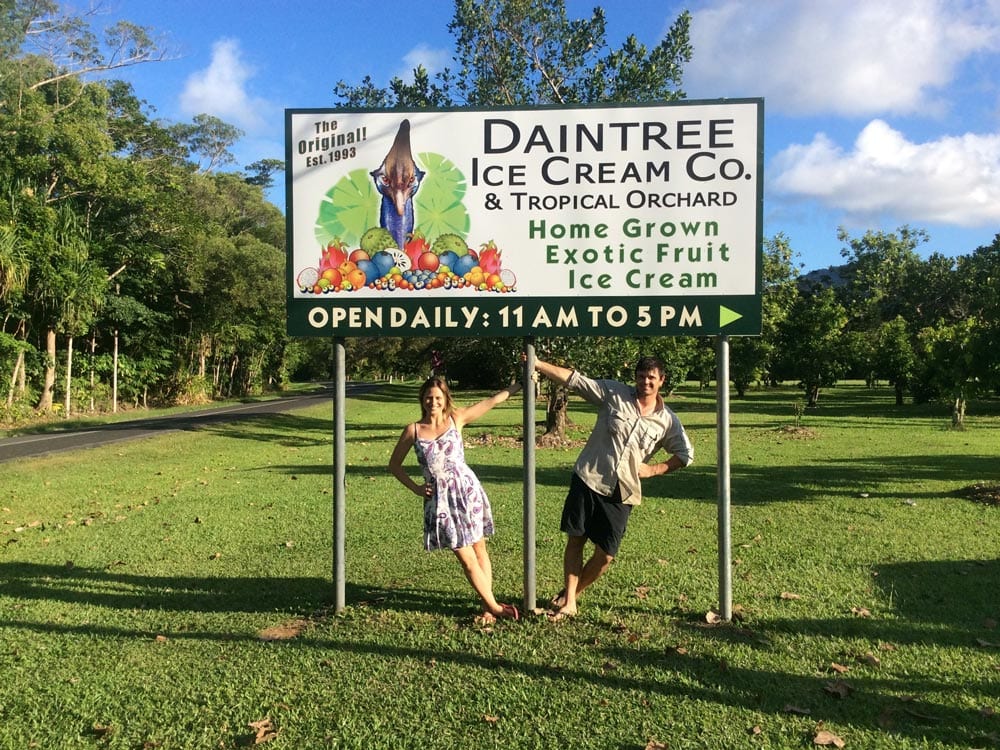
Keep reading our Australia Now series here.
Every day is different when you live in the wilds of the Daintree. But here are some of the things that are ticked off every day: Rise early. Pump water from our creek, which goes through particle and UV filters and into a holding tank for use during the day, check electricity (the generator and the state of the solar battery charge), pasteurise milk, cream and sugar (from local farmers), select fruit based on the perfect ripeness and blitz with sugar and/or dairy base, churn to make gelato and sorbets, bring to correct temperature for scooping and prepare our signature cups (four unique flavours of the day), open shop and spend the day making people happy. In the afternoon/evenings – do orchard work like mowing, fruit picking and tree maintenance.
If we are lucky, get in some sightings of the unique wildlife that surrounds us such as cassowaries, butterflies, pademelons.
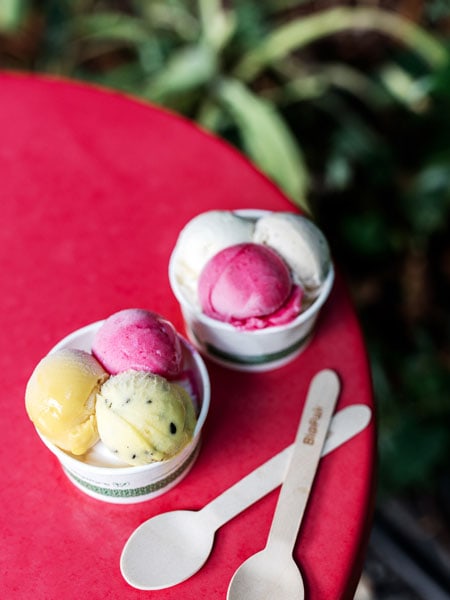
The Daintree Ice Cream Company are famous for their exotic fruit ice cream.(Image: Tourism & Events Queensland)
We live and work in paradise. The natural wonders of the Daintree are truly incredible and not a day goes by where we are not humbled or surprised by the forest and its inhabitants. We also enjoy helping people foster a connection with their food – to enjoy a fruit ice cream under the very tree where it was grown can be a rare and humbling experience, especially in a world dominated by heavily processed and packaged food.
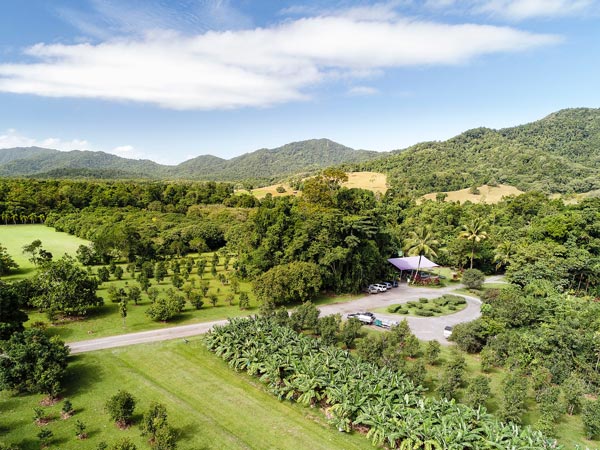
Aerial view of the picturesque location of the Daintree Ice Cream Company. (Image: Tourism & Events Queensland)
Living in the jungle means we need to be 100 per cent self-sufficient, and working in harmony with our natural environment is the key to keeping our business sustainable, ethical and accountable. Our business runs predominantly on solar power (using a generator only when necessary), our orchard receives an annual rainfall of about four metres per year, which means we don’t need to irrigate and any water we do use comes straight out of our own river. We also reduce, reuse and recycle at every opportunity.
Aside from using organic farming practices, we have also been experimenting with adding native ‘companion’ plants to fix nitrogen in the soil and ‘sacrificial’ plants to stop pests eating fruit crops. We have revegetated parts of the property to create food and habitat corridors for native wildlife species as well as becoming a member of the Humane Society International Land Trust for Nature.
We hope that by using our land holistically we can contribute to a better understanding of rainforest ecosystems. It is important that we preserve wild areas and act as stewards for native flora and fauna. We hope to demonstrate how successful businesses and ethical land management can co-exist and enrich one another if done correctly.
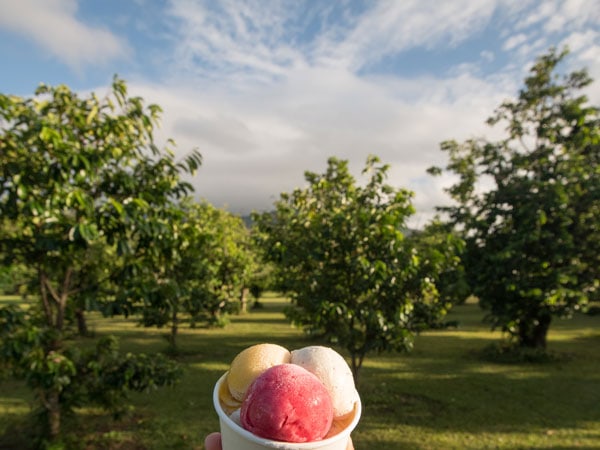
Jenna Rumney & Dave Mainwaring use organic farming practices to produce their ice cream. (Image: Tourism & Events Queensland)
Although the past 18 months have been extremely difficult, we were able to continue operating in some capacity most of the time thanks to the domestic market and our wonderful locals. This experience was also a time to slow down and re-prioritise our focus and work-life balance. It helped us identify the need to diversify some of our products in case of more uncertainty arising in the future (can’t say too much on this yet, other than ‘watch this space’).
On a personal level, it made us appreciate our good fortune at being born in Australia, a country with low population density and relatively affordable healthcare. Finally, it highlighted the importance of social cohesion in a small community like ours and the need to be there for each other and work together to get through the tough times.
In our downtime (what downtime?) we try to explore the amazing natural world that surrounds us. Snorkelling and diving on the Great Barrier Reef or 4WDing and camping in the rainforest – basically just getting out amongst it and trying to make the most out of where we live!
In 2019, the Port Douglas and Daintree region became the world’s first destination to be awarded Ecotourism Australia’s ECO Destination Certification. This was an exciting achievement and one which our community should be very proud of. It signifies a commitment to visitors that, as a region, we are committed to strong, well-managed sustainable practices and providing high-quality nature-based experiences. This is especially important since we are nestled between two World Heritage-listed areas – the Great Barrier Reef and Daintree Rainforest.
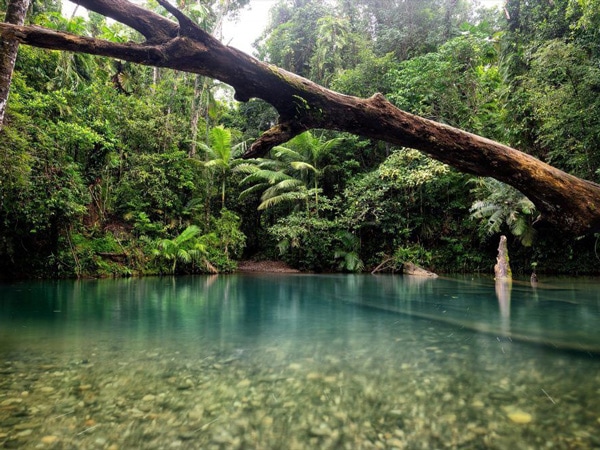
See the Daintree National Park.
The Ecotourism Australia’s ECO Destination Certification is a drawcard for the rising number of ‘ethical travellers’ – people wanting to minimise their environmental impacts and support sustainable operators while on holiday. To have council, tourism operators, community groups and individuals all work together to achieve this historic outcome sets a new benchmark for collaboration, sends the message that we are serious about taking care of our natural assets and will hopefully inspire other places around the world to implement sustainable tourism practices as well.
LEAVE YOUR COMMENT